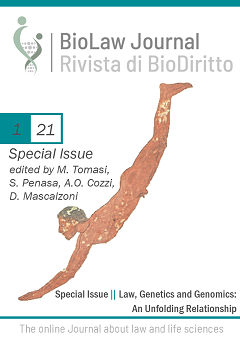Incidental findings and the right not to know in clinical setting: constitutional perspectives
DOI:
https://doi.org/10.15168/2284-4503-776Parole chiave:
Incidental findings, Genome sequencing, Autonomy, Privacy, Negative and positive libertiesAbstract
Next generation sequencing (NGS) induces frequent discoveries of incidental findings. This means that, during the sequencing, primary information concerning the alteration in gene for which the sequencing test was ordered goes with other information on different alterations. This problem is first faced by laboratories, followed by clinicians. The core question is whether to inform patients of those alterations. The first part of this paper overviews the guidelines adopted by the scientific community to set incidental findings. References are made to the 2016 European Guidelines for Diagnostic NGS, U.S. Recommendations adopted in 2013 and revised twice, in 2015 and in 2016, Italian Report of Bioethics Committee of 2016, and French Guidelines on secondary findings related to cancer gene of 2018. The second part of this paper discusses the rationale of "the right not to know" and analyses two main frameworks: autonomy and privacy. An attempt is made to consider the issue through different constitutional backgrounds: the U.S. and French notion of autonomy and freedom, and the Italian constitutional background. This paper argues that the right not to know is a negative right comprising a denial, but whose exercise requires positive obligations from clinicians to fulfil an effective and conscious choice. Recalling a famous U.S. debate on negative and positive liberty, a synthesis of the two sides could be managed through a procedural setting of consent, including information about family members. In this sense, the right not to know refers to a constitutional pattern of principles that is not limited to self-determination but entails solidarity and responsibility.##submission.downloads##
Pubblicato
2021-05-12
Come citare
1.
Cozzi A-O. Incidental findings and the right not to know in clinical setting: constitutional perspectives. BioLaw [Internet]. 12 maggio 2021 [citato 15 febbraio 2026];(1S):79-109. Disponibile su: https://teseo.unitn.it/biolaw/article/view/1657
Fascicolo
Sezione
Troubling historical roots and contemporary challenges





